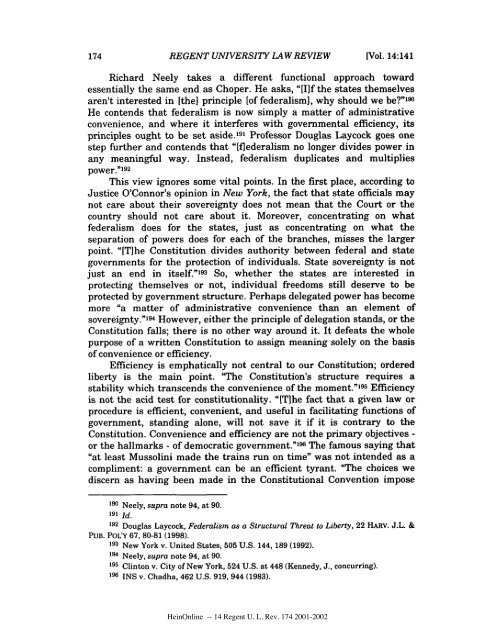Judicial ReEngineering
Judicial ReEngineering
Judicial ReEngineering
Create successful ePaper yourself
Turn your PDF publications into a flip-book with our unique Google optimized e-Paper software.
REGENT UNIVERSITY LAW REVIEW<br />
[Vol. 14:141<br />
Richard Neely takes a different functional approach toward<br />
essentially the same end as Choper. He asks, "[I]f the states themselves<br />
aren't interested in [the] principle [of federalism], why should we be?" 90<br />
He contends that federalism is now simply a matter of administrative<br />
convenience, and where it interferes with governmental efficiency, its<br />
principles ought to be set aside. 191 Professor Douglas Laycock goes one<br />
step further and contends that "[Ilederalism no longer divides power in<br />
any meaningful way. Instead, federalism duplicates and multiplies<br />
power.1 92<br />
This view ignores some vital points. In the first place, according to<br />
Justice O'Connor's opinion in New York, the fact that state officials may<br />
not care about their sovereignty does not mean that the Court or the<br />
country should not care about it. Moreover, concentrating on what<br />
federalism does for the states, just as concentrating on what the<br />
separation of powers does for each of the branches, misses the larger<br />
point. "ITihe Constitution divides authority between federal and state<br />
governments for the protection of individuals. State sovereignty is not<br />
just an end in itself." 193 So, whether the states are interested in<br />
protecting themselves or not, individual freedoms still deserve to be<br />
protected by government structure. Perhaps delegated power has become<br />
more "a matter of administrative convenience than an element of<br />
sovereignty." 194 However, either the principle of delegation stands, or the<br />
Constitution falls; there is no other way around it. It defeats the whole<br />
purpose of a written Constitution to assign meaning solely on the basis<br />
of convenience or efficiency.<br />
Efficiency is emphatically not central to our Constitution; ordered<br />
liberty is the main point. "The Constitution's structure requires a<br />
stability which transcends the convenience of the moment." 195 Efficiency<br />
is not the acid test for constitutionality. "[Tihe fact that a given law or<br />
procedure is efficient, convenient, and useful in facilitating functions of<br />
government, standing alone, will not save it if it is contrary to the<br />
Constitution. Convenience and efficiency are not the primary objectives -<br />
or the hallmarks - of democratic government." 19 6 The famous saying that<br />
"at least Mussolini made the trains run on time" was not intended as a<br />
compliment: a government can be an efficient tyrant. "The choices we<br />
discern as having been made in the Constitutional Convention impose<br />
190 Neely, supra note 94, at 90.<br />
191 Id.<br />
192 Douglas Laycock, Federalism as a Structural Threat to Liberty, 22 HARv. J.L. &<br />
PUB. POL'Y 67, 80-81 (1998).<br />
193 New York v. United States, 505 U.S. 144, 189 (1992).<br />
194 Neely, supra note 94, at 90.<br />
195 Clinton v. City of New York, 524 U.S. at 448 (Kennedy, J., concurring).<br />
196 INS v. Chadha, 462 U.S. 919, 944 (1983).<br />
HeinOnline -- 14 Regent U. L. Rev. 174 2001-2002

















